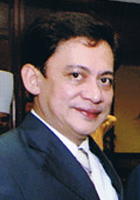Edwin Cordevilla Biography
Edwin M. Cordevilla, born on September 30,1967, is a poet based in the Philippines. He is the author of 'Phoenix and Other Poems, ' published in 2000, and 'The Occasions of Air, Fire, Water, Earth, ' his second book of poems published in 2012.
Cordevilla has performed some of the poems in the second collection at the Café Georgio in Makati City; the Far Eastern University Auditorium; Kapitan Moy Museum in Marikina City; at the Inner Sanctum Bar in Intramuros, Manila; at the Abelardo Hall and Bahay Kalinaw, both at the University of the Philippines-Diliman in Quezon City; at the Green Papaya Art Gallery in Quezon City; at the (defunct) Republic of Malate Bar; and at Penguin Café Gallery also in Malate, Manila.
During its diamond foundation anniversary celebrations in 2004, the Far Eastern University included Cordevilla in her Hall of Fame for Literature and Journalism. He is a member of the Philippine Center of International PEN (Poets, Essayists, and Novelists) .
In the introductions of three books on Philippine literary history and literary criticism, namely, The Likhaan Anthology of Philippine Literature in English from 1900 to the Present (University of the Philippines Press,1998) : A Habit of Shores: Filipino Poetry and Verse from English,60’s to the 90’s (University of the Philippines Press,1999) : and The Critical Villa: Essays in Literary Criticism (Ateneo de Manila University Press,2002) , Cordevilla is viewed as the last of the Filipino Romantic poets in English.
In “Mapping Our Poetic Terrain: Filipino Poetry in English from 1905 to the Present (1999) , ” Gemino H. Abad writes:
'Zulueta’s Like the Molave and Villa’s Poems by Doveglion (1941) could very well mark the end of the Romantic phase in our poetry. With Like the Molave, it had become important for the poet to reshape the Romantic usage in order that he might find his own voice and address more directly his own time. Villa found his own voice (Have Come, Am Here,1942; Volume Two,1949) , but in 1929 he had exiled himself to America. Then the War came, and the Romantic efflorescence of the 30’s wilted. But the Romantic spirit did not vanish altogether. Villa, who wrote his last poem, `The Anchored Angel, ’ in 1953, continued to be a strong influence in the craft of poetry well into the ‘70s, as one might see in the poems of Jolicco Cuadra and Luis Francia, and even today in Augustta de Almeidda and Edwin Cordevilla.'
Cordevilla is indeed a romantic poet, but he has also written socio-historical pieces like the epic-like poem “Jose Rizal” in Phoenix, while “Overlooking, ” “Children of Dreams, ” “When Music Fails, ” and “Vulgarities of Earth” are in this current volume. Aside from being the last of the Romantics, Cordevilla is also an avant-garde poet, seemingly engaged constantly in re-inventing his poetry, which is very apparent in most of his writings he refers to as “cordevillaesques.” In Occasions of Air, Fire, Water, there are poems with no punctuation, nouns used as verbs and verbs used as nouns. There are poems that imitate the shape of certain subjects as paintings, lines that dare the limit of the page, poems shorter than haiku, nonce words, reversed poems (with stanzas written in reverse) , poems that make use of the “lettric” symbols (words) themselves as metaphors, and so much more.
Although highly innovative, Cordevilla claims his “cordevillaesques” can be appreciated even by a sixth grade student.
In an art forum, Cordevilla described his passion for poetry as his communion with the universal soul and with the common man as well. “Poetry appreciation is a blessing from the heavens above that should not be confined among the elites, but should be relished by, as much as possible, anyone.”
Cordevilla's third book, the epic, 'Ten Thousand Lines Project For World Peace, ' is currently available in giant format.
Light dips its finger
In my wound bringing memories
Of unfulfilled promises
And ink tears
...
Today, the blessed rain sang over the land,
Surrendered her dreams to the feverish soil.
I said, `Ahoy lovely neighbors, I told you
The rain will come, and she does come alright,
...
The unseen is seen
In new light, and the seen
Is unseen, the shoulder conceals
What was known, it is a dream
...
i can only map the words
you have left me, the shade
of sunsets
sinking in my flesh.
...
'Whoever tells you that flight
is out there, or up there,
is gravely mistaken. The real sky
is within one's self. True flight
...
